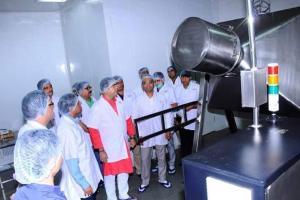What does it take to be a resident surgeon? On a sleepless night, drilling a hole into the head of a 55-year-old coma patient and the resultant theatre of blood and nerves, offered the answer

 September 13, 2007. 2 AM. Neuro-ICU. Department of Neurological Sciences, Christian Medical College, Vellore. It was the second month of my residency programme in neurosurgery and I was struggling to stay afloat after being thrown into the deep end. I had barely returned to my hostel after 24 hours of rigour and the fleeting joy of changing into airy boxers was robbed by a phone call.
September 13, 2007. 2 AM. Neuro-ICU. Department of Neurological Sciences, Christian Medical College, Vellore. It was the second month of my residency programme in neurosurgery and I was struggling to stay afloat after being thrown into the deep end. I had barely returned to my hostel after 24 hours of rigour and the fleeting joy of changing into airy boxers was robbed by a phone call.
"Go ahead and put two burr holes into his head; drain the blood clot for Muthu," the chief resident ordered. "Call me if you face any difficulty. Santhosh will help you. He has done plenty of them."
ADVERTISEMENT
This signalled his exit to Chaikada, a hole-in-the-wall stall across the entrance of the hospital that served a delicious combination of tea and cigarettes, keeping resident doctors awake for 36 hours at a stretch.
Muthu was a 55-year-old pot-bellied South Indian who was brought to the emergency department drowsy. He had slipped into a coma within a few minutes of arriving. Imaging revealed chronic subdural hematoma, a blood clot that forms right beneath the outer covering of the brain; the resultant pressure leaving him unconsciousness.
We rushed him to the OT, shaved his head, cleaned and draped him in the usual fashion. After administering local anesthesia and making an incision in the scalp, the senior resident handed me the power drill. I would be boring a hole into the skull for the first time. I felt like Kajol in the DDLJ climax while Amrish Puri relinquished control, with 'Ja Simran ja, jee le apni zindagi'.
With hope in my heart and pressure on my palms, I drilled as the bone swivelled into dust on the way to reaching the dura, the outer covering of the brain. Normally, this layer is glistening white. But due to the underlying blood, it had taken a bluish hue. This brought a sense of relief since it confirmed that we were operating on the correct patient, and the right side of his head had been opened. An important double check at 3 am.
I coagulated the tiny blood vessels on the dura, and with a knife, made a cruciate nick. A dark jet of altered blood spurted out under profuse pressure as we used a large suction to drain as much of it as possible to prevent it from splaterring onto my mask.
And then came one of the most ethereal sights I had seen. The surface of the brain gently rose close to the bone as if to say, 'thank you for taking the load off my back'. I was hypnotised, seeing in reality what I had until then only read in text books.
Just then, Muthu mouthed the choicest Tamil profanity for having been woken up from deep slumber. While we sutured the skin, he was fully awake and talked coherently, although he was still abusing us—a sign of good health and prosperity in many cultures including my own.
As we wheeled him out of the operating theatre, his family acknowledged our effort, their hands joined. Their bread winner was back to life.
I thanked Santhosh, the senior resident, as we walked out to grab filter coffee, the bluish grey walls of the hospital engulfed in a purple haze just before the crack of dawn. Training is neurosurgery in India means working 20, even 24 hours a day in sub-optimal conditions, sacrificing family, friends, and food.
At work, we follow a coma scale to assess patients whose consciousness is not intact. It has a maximum score of 15. Decreasing scores suggest confusion, delirium, and unresponsiveness to verbal commands or various forms of pain stimuli. Normal individuals have a score of 15, which is suggestive of alertness and appropriate understanding of surroundings. Traditionally, neurosurgery residents fluctuate between a score of 12 and 14, which is consistent with moderate to severe disorientation. It was for these reasons that the Americans mandated the 80-hour work week for residents.
But it's these years of hardship that build a surgeon's character, refine his judgment, allow intuition, perception and awareness to guide decision making.
Every day, I ask myself: Am I doing the right thing for my patient? Because, at the end of the day, all each of us wants to do is get better. "Better is possible. It does not take genius. It takes diligence. It takes moral clarity. It takes ingenuity. And above all, it takes a willingness to try," says bestselling author, American surgeon and public health researcher Atul Gawande.
The writer is a practising neurosurgeon at Wockhardt Hospitals and Honorary Assistant Professor of Neurosurgery at Grant Medical College and Sir JJ Group of Hospitals
Catch up on all the latest Crime, National, International and Hatke news here. Also download the new mid-day Android and iOS apps to get latest updates
 Subscribe today by clicking the link and stay updated with the latest news!" Click here!
Subscribe today by clicking the link and stay updated with the latest news!" Click here!







